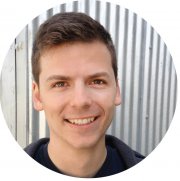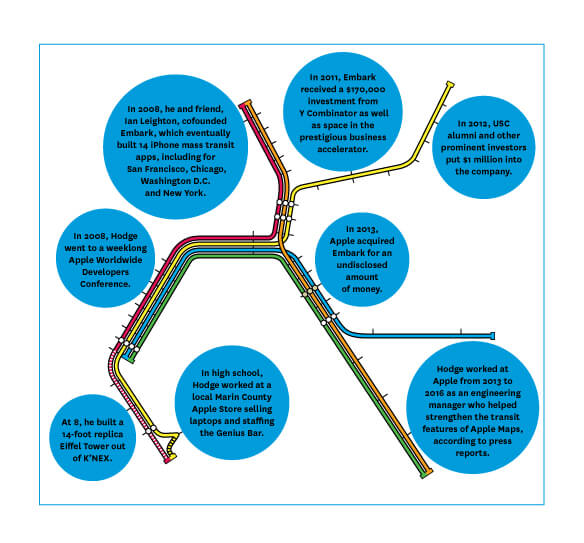David Hodge was, is and will always be an “Apple fanboy,” he said.
“Apple builds very powerful and exciting technology,” said Hodge, B.S. CS ’11. “And it keeps coming back into my life.”
In high school, Hodge worked at a Marin County Apple Store selling laptops and staffing the Genius Bar. For fun, he and his friends attended Apple product launches. As an undergrad at USC Viterbi, Hodge went to a weeklong Apple Worldwide Developers Conference, where he learned how to lever-age Apple software to build iPhone apps.
Hodge put that knowledge to good use.
In 2008, Hodge — working largely from his dorm room at USC — and his business partners founded Embark, an iPhone app designed to make trip planning easy, send out notifications when trains and buses are running late and operate underground with no cellular signal. The company eventually created 14 iPhone mass transit apps for cities including San Francisco, Chicago, Washington, D.C., and New York. Apple recognized the value, and in 2013 acquired Embark for an undisclosed amount.
For the next three years, Hodge had a “fun adventure” at Apple working as an engineering manager overseeing a team of 25 people. During his tenure, Embark’s tech-nology helped strengthen the transit features of Apple Maps, according to press reports.
Hodge, who recently left Apple, has always been something of a technological whiz kid.
At 8, he built a 14-foot replica of the Eiffel Tower out of K’NEX. In high school, he wrote software code that made the Garage Band app easier to use. He also disassembled an old computer and transformed it into a DVR.
The idea that led to Embark germinated after Hodge and his friend Ian Leighton attended the Apple Worldwide Developers Conference. They spent the summer of 2008 working on a mass transit app for the Bay Area, and in fact released an early version of iBart before they headed back to college, Hodge to USC and Leighton to UC Berkeley.
The overwhelmingly positive response convinced them to continue. During the school year, Hodge set aside two nights a week to work on the app and communicated often with Leighton by phone and email. They built apps for additional cities as well.
In 2011, Embark received a $170,000 investment from Y Combinator as well as space in the prestigious business accelerator. A year later, USC alumni and other prominent investors put $1 million into the company, which received an award from the Metropolitan Transportation Authority for the best new transit app in New York City.
“I invested in Embark because I thought the company’s mapping application was very unique and had great utility for consumers,” said venture capitalist Mark Stevens, B.S. EE ’81, M.S. CE ’84. “I made a two-times gain on my investment. I look forward to financing David’s next endeavor.”
USC Viterbi played an integral role in Embark’s success, Hodge said. Professor Mark Crowley gave the team a free on-campus workspace, while four of the company’s five cofounders hail from the school.
“At USC Viterbi, I gained deep computer science knowledge that allowed us to solve problems that our competitors could not,” Hodge said. “Perhaps more important, group engineering projects built my network of great peers to learn from, work with and hire in the future.”





